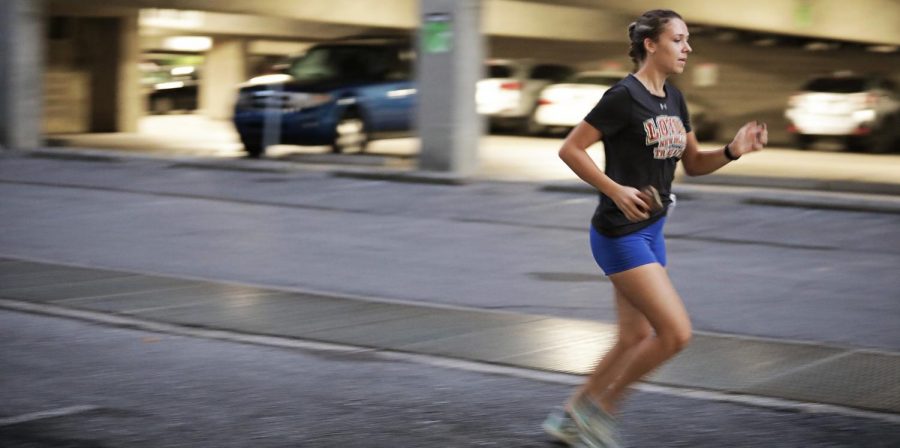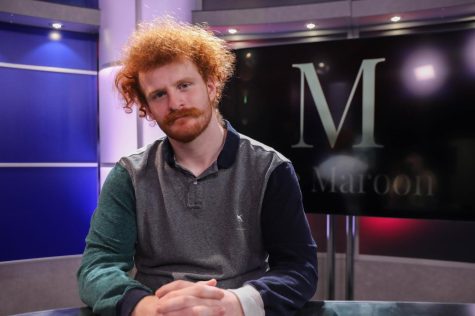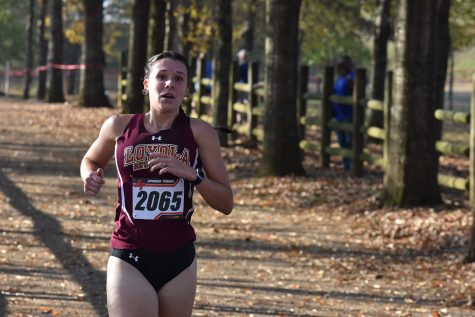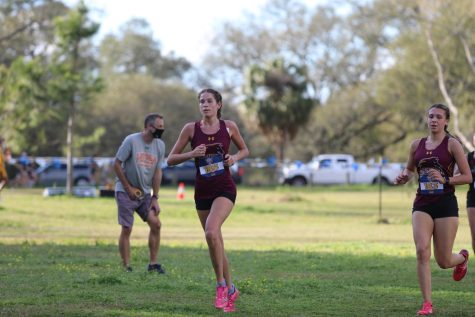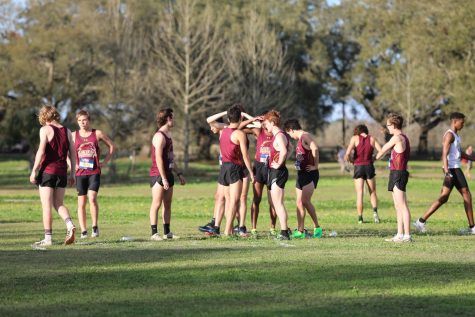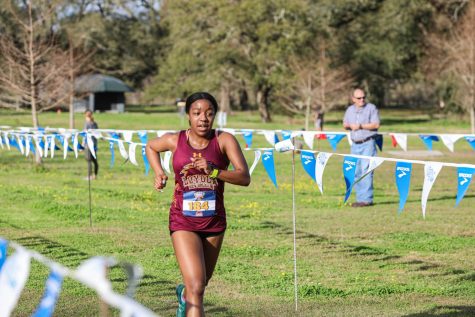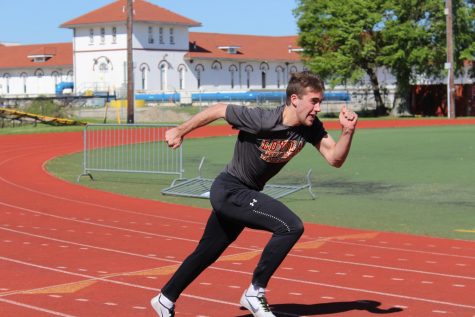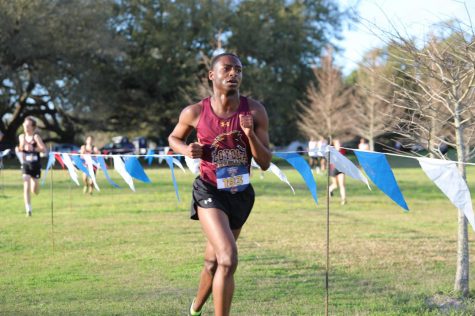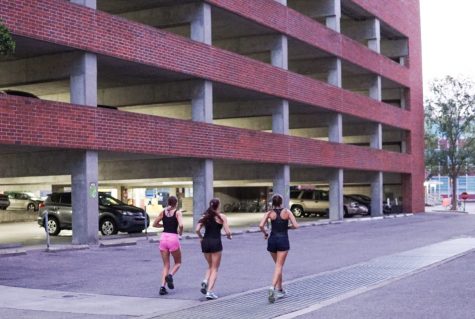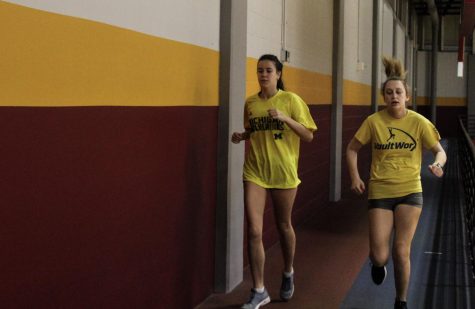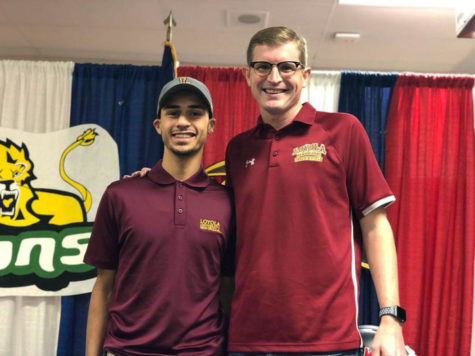Cross country prepares for uncertain season
A member of the cross country team runs at an early morning practice Sept. 1. The team has been running in small groups in order to abide by COVID-19 safety guidelines. Photo credit: Peter Buffo
September 3, 2020
Cooper Talbott, psychology sophomore, expected to finish summer 2020 in New Orleans, sweating alongside his teammates in preparation for a new cross country season. But while the Wolf Pack spent its first practice jogging alongside the St. Charles Streetcar Line, Talbott was running down a country road in Southeastern New York— on his own.
“I had every intention of coming back,” Talbott said. “Me and my roommates had talked about it, and we were all going to try to make it work, but just seeing how everything is changing, there’s no real way to tell what’s going to happen a week from now or a day from now. I just figured that it was not worth the risk.”
Talbott made the difficult decision to opt out of the 2020 cross country season thanks in no small part to a family member’s experience on the front lines of the pandemic.
“My brother works in the emergency room. He’s a doctor,” said Talbott. “Hearing what he had to say about it, some people could be completely fine, some people are ending up in the hospital. I really didn’t want to gamble permanent lung damage, especially when my scholarship depends on my ability to run.”
Cross country became the only sport competing on campus this fall when the Southern States Athletic Conference postponed the women’s volleyball season to Spring 2021. The SSAC conference cross country meet is scheduled for Nov. 7, according to the SSAC website.
Talbott is completing his fall semester classes from the New York town where he works as a “personal camp counselor” for a family friend’s grandchild. He’s remained in full contact with his cross country teammates and coaches.
But Talbott wasn’t the only Loyola athlete who chose to sit out the fall sports season.
“We have had some student athletes opt out of this semester,” said Loyola Athletic Director Brett Simpson. “We support their decision 100% and they can do so without penalty of future roster spot or athletic scholarship.”
Student athletes who chose to opt out were not charged a semester of competition by the National Association of Intercollegiate Athletics, meaning that they wouldn’t lose any eligibility for their time spent away from competition. Some athletes even chose to use their opt out like a redshirt season, according to head track and cross country coach Geoff Masanet.
Eligibility was not at the forefront of Talbott’s mind when he made his decision.
“I was thinking of how I would impact the New Orleans community. Like, if I got sick in New York and then I went to New Orleans, how was I going to affect that community?” Talbott said. “The D1 NCAA National Championships just got cancelled: those are like the best of the best, they’re the big dogs. So if all the big schools are saying this isn’t going to work, I just don’t see how it could work.”
But the athletics department has been affected by more than just opt outs in the wake of the pandemic.
At least six Loyola student-athletes were quarantined in their dorms from Aug. 17 to Aug. 31 after coming into contact with a teammate who tested positive for COVID-19. None of those students have tested positive since August 17.
New coach, new challenges
As an incoming coach, Masanet had a turbulent start to his time in New Orleans. On January 12, 2020, the athletic department announced that he’d joined the Wolf Pack coaching staff. Nine weeks later, on March 16, the NAIA announced that it had cancelled the 2020 spring sports season.
“The difficult thing first of all was coming in at the semester, and coming in a week or two after school already started, that’s challenging enough,” said Masanet. “Then to have everything stop cold-turkey and then start back up, we’re actually in a funkier place now than we were in March. It’s easier to just stop something. It’s a lot harder to try and start it with all this going on.”
For Masanet, the safety of his players is more important than posting winning times.
“Just because they have (the SSAC conference meet) doesn’t mean we have to go,” said Masanet. “No one’s going to put a gun to our head, and I don’t think I would be canned over asking to make a decision to not attend a conference meet if we just weren’t comfortable with it.”
In his short time at Loyola, Masanet has earned the trust of many of his players. Business analytics junior Christian Hanson and pre-health biology sophomore Madisyn Acosta were quick to compliment their head coach.
“I’m very excited to see what coach can give us with a full year,” 2019 All-SSAC runner Hanson said. “He’s a great guy, really cares about all of us, and you can tell. He even tells you to call him if you feel sick or if he can do anything for you, and I respect him deeply for that.”
“He connects with the team very well, I would say it’s been very easy with him coming in,” Acosta said. “It was hard at first, but we’re lucky to have him,” Acosta said.
Why keep running?
Acosta said she never considered opting out.
“(Cross country) gets me through the school year,” said Acosta. “It’s therapeutic for me. It helps me get through the day.”
Hanson said that he considered opting out after some close friends decided to take a step back, but he couldn’t pass up a chance at competing alongside his teammates.
“I’m kind of the only junior guy on the team now, and I’m not going to lie, that took a little bit of a toll on me. At the same time, if there was still a season, I was planning on running,” he said. “When I don’t run, I get moody and agitated. Without it, I would not be the person I am, that’s for sure.”
Hanson said that he feels confident that his team will make it through the season safely and responsibly.
“The Ochsner Center is taking great procedures in making sure that we’re healthy,” he said. “It all depends on the guys and the girls that show up to practice and what we do in our daily lives. I believe in my team.cI trust them 100%, and I think we’re all going to be ok.”
Acosta said that despite the unusual circumstances, her first practice with the 2020 cross country team felt quite familiar.
“After we got running, it felt normal,” she said. “It was a really good feeling to get back to school and just running with your team again. It was a very good feeling.”
An uncertain future
The Wolf Pack is training to compete in November’s conference meet, but the program may have a chance to square off against other New Orleans colleges as early as September. However, there are still questions about the logistics of the potential race.
“If we do move forward with our meet at City Park, we’re operating under guidelines that say we’re only allowed to have (25) people at any gathering,” said Masanet. “Is that a race of kids? Is that a race plus coaches and trainers standing around? Is that both a guys’ and a girls’ race? There’s really not a good definition.”
Masanet says that there’s about an 80% chance that he’ll feel comfortable enough to take his athletes to the New Orleans meet. Beyond those two planned races, the program’s schedule becomes more unclear.
“If you were to pick 10 schools in the Southeast, NAIA through NCAA Division I, most schools don’t have any schedule posted,” said Masanet. “Right now, we don’t have much of a schedule barring us diving into the deep end of the pool and going on overnight trips, which none of us are comfortable with.”
While the immediate future of the cross country season remains uncertain, the upcoming winter and spring track and field seasons are not far from anyone’s mind. Acosta, Talbott and Hanson are also members of the track team.
All three are optimistic that a more normal track season is on the horizon, but Talbott has some reservations.
“I’m going to be super impressed if they pull it off,” said Talbott. “I want them to. I don’t want anyone to get sick. I just think that if everybody stayed home and didn’t run and kept training, then I think by January, cases would be down. I think our school is a little special because the South is such a hot spot. Most, if not all, the teams we compete with are from Southern states, and I think if cases are high in the South, and we don’t have control over what other teams are doing, if they’re safe, I think its inevitable that someone, somewhere comes in contact with it.”


